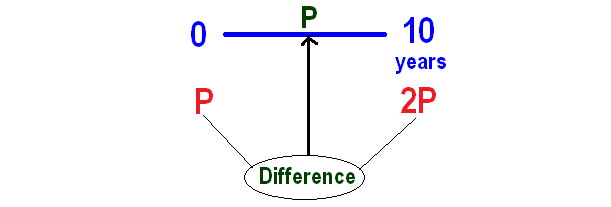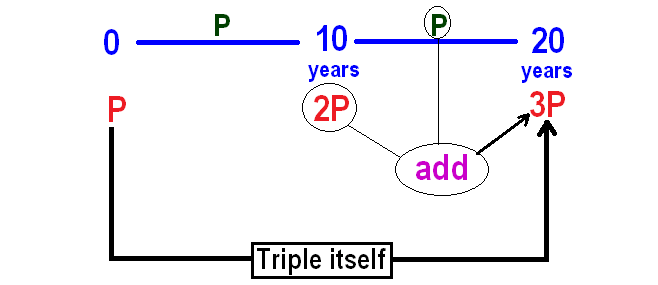SIMPLE INTEREST PROBLEMS WITH SOLUTIONS
Problem 1 :
A person deposits $5,000 in a bank account which pays 6% simple interest per year. Find the value of his deposit after 4 years.
Solution :
Formula for simple interest is
I = Prt
Substitute P = 5000, t = 4, r = 6%.
I = 5000 ⋅ 6/100 ⋅ 4
I = 1200
Accumulated value = Principal + Interest
= 5000 + 1200
= $6200
Problem 2 :
Glen received $2,250 loan from bank. After six months, he paid back $2,295 and closed the loan. Find the rate of interest.
Solution :
Interest = Amount - Principal
I = 2295 - 2250
I = 45
Given : Time period is 6 months.
In simple interest formula, we use time period in years. But, the time period given in the question is in months.
So, let us change the given time period in years.
6 months = 6/12 year = 1/2 years
So, the time period is 1/2 year.
Formula for simple interest :
I = Prt
Substitute I = 45, P = 2250, t = 1/2.
45 = 2250 ⋅ r ⋅ 1/2
45 = 1125 ⋅ r
Divide both sides by 1125.
45/1125 = r
0.04 = r
To convert the decimal 0.04 into percentage, multiply it by 100.
0.04 ⋅ 100% = r
4% = r
Problem 3 :
A man invests $16,500 in two kinds treasury notes, which yield 7.5% and 6% annually. After two years year, he earns $2442 in interest. How much does he invest at the 6 % rate ?
Solution :
Let x be the amount invested at 6% rate.
Then, the amount invested in 7.5% account is
= 16500 - x
Given : After two years, total interest earned in both the accounts is $2,442.
Interest at 6% rate + Interest at 7.5% rate = 2442
x ⋅ 6/100 ⋅ 2 + (16500 - x) ⋅ 7.5/100 ⋅ 2 = 2442
x ⋅ 0.06 ⋅ 2 + (16500 - x) ⋅ 0.075 ⋅ 2 = 2442
0.12x + (16500 - x) ⋅ 0.15 = 2442
0.12x + 2475 - 0.15x = 2442
2475 - 0.03x = 2442
2475 - 2442 = 0.03x
33 = 0.03x
Divide both sides by 0.03.
33/0.03 = x
3300/3 = x
1100 = x
Hence, the amount invested at 6% rate is $1100.
Problem 4 :
A person invested $25,200 in two accounts, which pay 5 % and 10% interest annually. The amount invested at 10% rate is 110% of the amount invested at 5% rate. After three years year, he earns $5760 in interest. How much did he invest at the 5% rate ?
Solution :
Let x be the amount invested at 5% rate.
Then, the amount invested in 10% account is
= 110% of x
= 1.10 ⋅ x
= 1.1x
Given : After three years, total interest earned in both the accounts is $5,760.
Interest at 5% rate + Interest at 10% rate = 5760
x ⋅ 5/100 ⋅ 3 + 1.1x ⋅ 10/100 ⋅ 3 = 5760
x ⋅ 0.05 ⋅ 3 + 1.1x ⋅ 0.1 ⋅ 3 = 5760
0.15x + 0.33x = 5760
0.48x = 5760
Divide both sides by 0.48.
x = 5760/0.48
x = 576000/48
x = 12000
Hence, the amount invested at 5% rate is $12000.
Problem 5 :
In simple interest, a sum of money doubles itself in 10 years. Find the number of years it will take to triple itself.
Solution :
Let P be the sum of money invested.
Given : Sum of money doubles itself in 10 years.
Then, P will become 2P in 10 years.
Now we can calculate interest for ten years as given below.

From the above calculation, P is the interest for the first 10 years.
In simple interest, interest earned will be same for every year.
So, interest earned in the next 10 years also will be P.
It has been explained below.

Hence, it will take 20 years for the principal to become triple itself.
Problem 6 :
In simple interest, a sum of money amounts to $ 6200 in 2 years and $ 7400 in 3 years. Find the principal.
Solution :
At the end of 2 years, we get $6200
At the end of 3 years, we get $7400
From these two information, we can get the interest earned in the 3rd year as given below.

In simple interest, interest will be same for every year.
Based on this, we can calculate the principal as given below.

Hence, the principal is $3800.
Kindly mail your feedback to v4formath@gmail.com
We always appreciate your feedback.
©All rights reserved. onlinemath4all.com
Recent Articles
-
Digital SAT Math Problems and Solutions (Part - 150)
Apr 25, 25 11:46 AM
Digital SAT Math Problems and Solutions (Part - 150) -
AP Calculus AB Problems with Solutions (Part - 19)
Apr 24, 25 11:10 PM
AP Calculus AB Problems with Solutions (Part - 19) -
AP Calculus AB Problems with Solutions (Part - 18)
Apr 24, 25 11:06 PM
AP Calculus AB Problems with Solutions (Part - 18)
